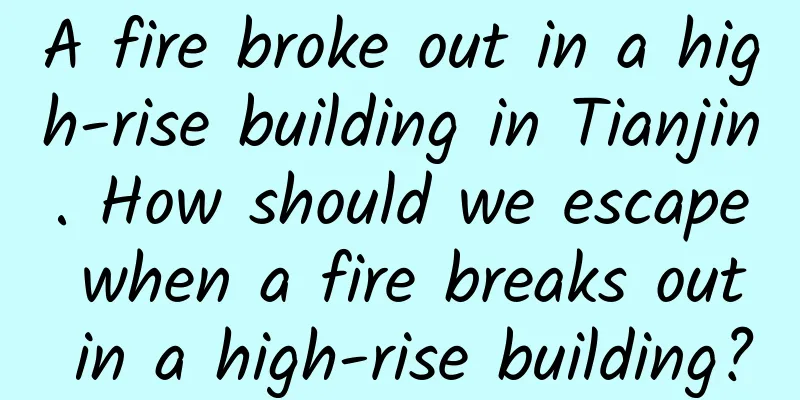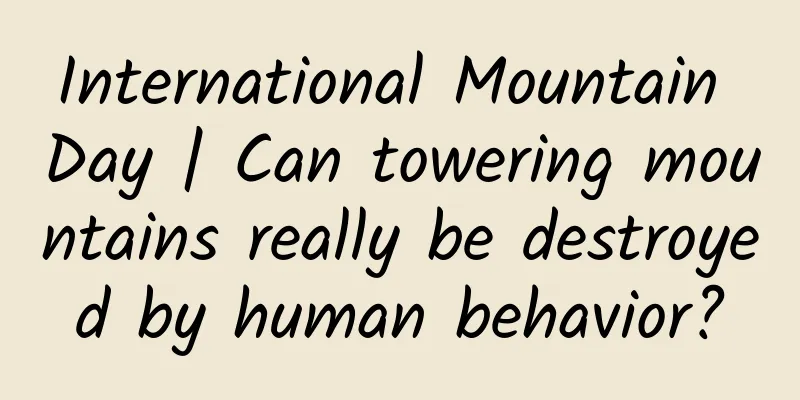A fire broke out in a high-rise building in Tianjin. How should we escape when a fire breaks out in a high-rise building?

|
According to China National Radio, a fire broke out in a high-rise building in Nankai District, Tianjin on the afternoon of August 22. The specific casualties are not yet known. Faced with complex and ever-changing fire risks, only when everyone learns and masters the necessary fire-fighting knowledge, consciously regulates behavior, and cultivates safe habits can we minimize risks and prevent fires. So when a fire occurs, how can we save ourselves and escape correctly? Video source: Science Popularization China Science Vision First, you need to be familiar with the risks in residential and workplace environments, escape routes, and the location of firefighting equipment. Secondly, when calling the "119" fire alarm number, you must provide detailed and accurate information. When reporting a fire, you should state the detailed address, the burning object, the people and the fire situation, and leave accurate contact information. Copyrighted images from the gallery, unauthorized reproduction, please contact the original author After a fire occurs, you must be able to make the correct judgment whether to run or not, and choose the correct escape and risk avoidance plan. More importantly, you need to observe and accumulate more experience in daily life, stay calm after encountering a fire, and make rational judgments. When a fire occurs in your home and you are unable to put out the fire, you should immediately try to escape. Do not be greedy for property. Close the door when leaving the house to prevent smoke from spreading to the stairwell, causing the fire to spread and affecting the escape of others. Copyrighted images from the gallery, unauthorized reproduction, please contact the original author Make scientific and rational judgments based on the location of the fire. Taking a high-rise residential building as an example, if you are below the fire floor, you should escape through the evacuation stairs and run to an open area outdoors in time. You are not allowed to take the elevator to escape from a fire. After a fire occurs, the elevator may lose power, and thick smoke and fire may spread through the elevator shaft. If you are above the fire floor, you need to first make sure the evacuation stairs are safe. High-temperature smoke and fire generally spread upward. At this time, we should first observe whether there is smoke in the evacuation passage and stairwell. If there is no smoke or fire, you can escape downward in time; if there is already thick smoke spreading, do not rush in. Experiments have shown that the vertical diffusion speed of smoke can reach 3 to 4 meters per second, up to 8 meters per second, and a delay of 25s to 35s can spread to a height of 100m. Copyrighted images from the gallery, unauthorized reproduction, please contact the original author If you cannot open the door to escape, or if you find that the front is blocked by fire and thick smoke during the escape process and the conditions for escape are not met, you should quickly return to your room. If you cannot return to your room in time, you should knock on the door and shout in time, try to enter the nearest room for temporary shelter, or take shelter in relatively safe areas such as the refuge floor or refuge room in the building. At this time, you can seek help through the mobile phone, and at the same time, you should call for help through the window to let the rescuers determine your location as much as possible. Stay calm while waiting for rescue. If conditions permit, you can use a wet towel to block the door gap to isolate smoke penetration, and cool the door by watering, etc., to delay the fire breakout time as much as possible. In short, the fire scene changes rapidly, and there are no immutable rules for escape and self-rescue. Only by staying calm and rational in the face of things can you avoid danger. Sources: "More fire knowledge means less fire risk - Experts remind us to face fire risks", Science Popularization China |
<<: This may be the most rigorous "full body checkup" in the world...
>>: How far are we from AGI? The big model is not the final solution, the world model is the future
Recommend
Online medical consultation mini program function, how much does it cost to develop an online medical consultation mini program?
With the continuous development of informatization...
Zhang Weiping's complete basketball teaching collection_Zhang Weiping's basketball teaching video collection_Basketball beginners' introductory teaching Baidu cloud download
Zhang Weiping's complete basketball teaching ...
The latest policy on Beijing’s passenger car quota in 2022: What is the personal new energy quota?
As the capital of our country, Beijing is the cit...
Bread crumbs scattered on Mars: Hansel and Gretel, please reply!
With "Martian Breadcrumbs" - an unprece...
Apple's stock price plummeted 6% and has embarked on a bear market
On Friday, Apple's stock price plummeted agai...
Is the ocean salty? This satellite tells you
At 6:42 on November 14, the Ocean Salinity Detect...
WeChat secretly accesses photo albums. Are these apps really that rebellious?
[[428187]] I don’t know if you guys still remembe...
Aston Martin DBX to be unveiled in 2019 Are you sure it's an SUV?
Nowadays, major luxury sports car manufacturers h...
WeChat 5.4: Tencent’s ambitions are clear
On August 14, WeChat iOS version 5.4 was official...
360 search text link advertising, introduction to delivery styles and sales methods!
Search text links Search text links are a type of...
Huawei App Market Brand Resource Bidding Promotion Service Rules!
These rules are based on the Huawei Developer Ser...
Optimization strategy for B station video native advertising
As a cultural community and video platform where ...
The brand name marketing rules you don’t know!
Everyone is familiar with Wang Laoji, but have yo...
Feeling tired after the beginning of summer? How to eat more energetically? Here are 8 tips for you
Image from: freepik.com After the beginning of su...
Do you know how to wash and maintain these quilts?
How to wash and maintain the quilt The autumn rai...









